外研版英语七年级下Module 8 Story timeUnit 3 Language in use课件(44张PPT无素材)
文档属性
| 名称 | 外研版英语七年级下Module 8 Story timeUnit 3 Language in use课件(44张PPT无素材) |
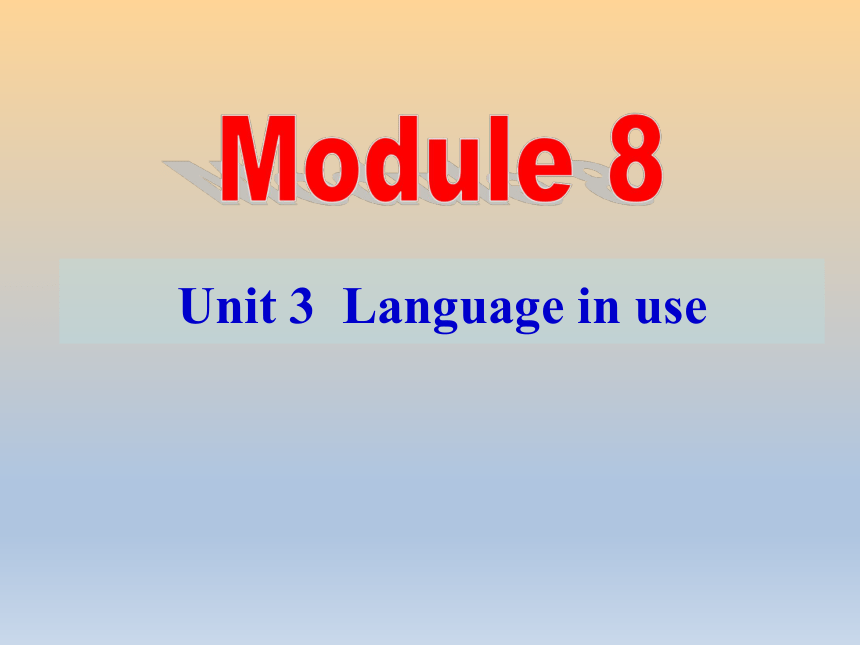
|
|
| 格式 | zip | ||
| 文件大小 | 2.6MB | ||
| 资源类型 | 教案 | ||
| 版本资源 | 外研版 | ||
| 科目 | 英语 | ||
| 更新时间 | 2020-04-18 00:50:59 | ||
图片预览

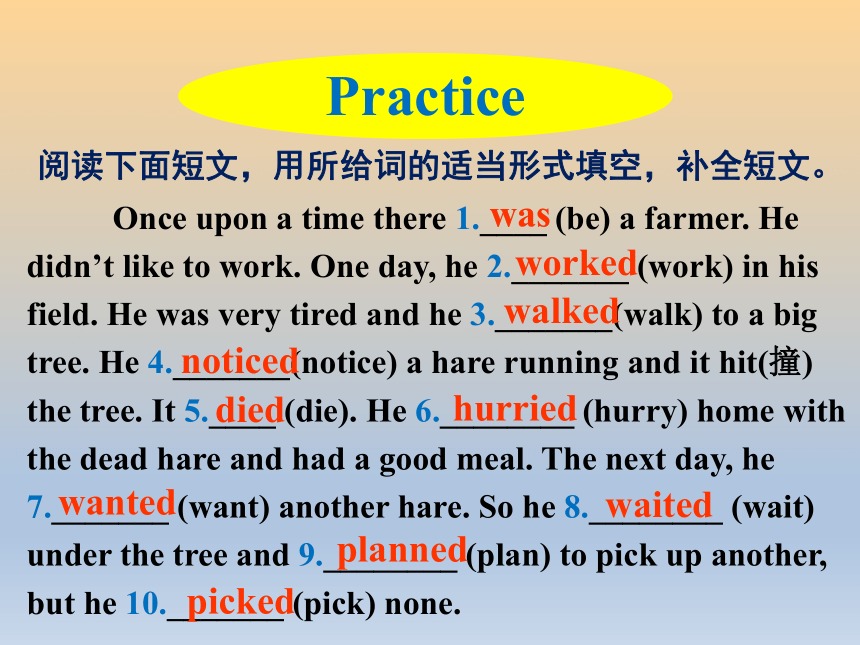
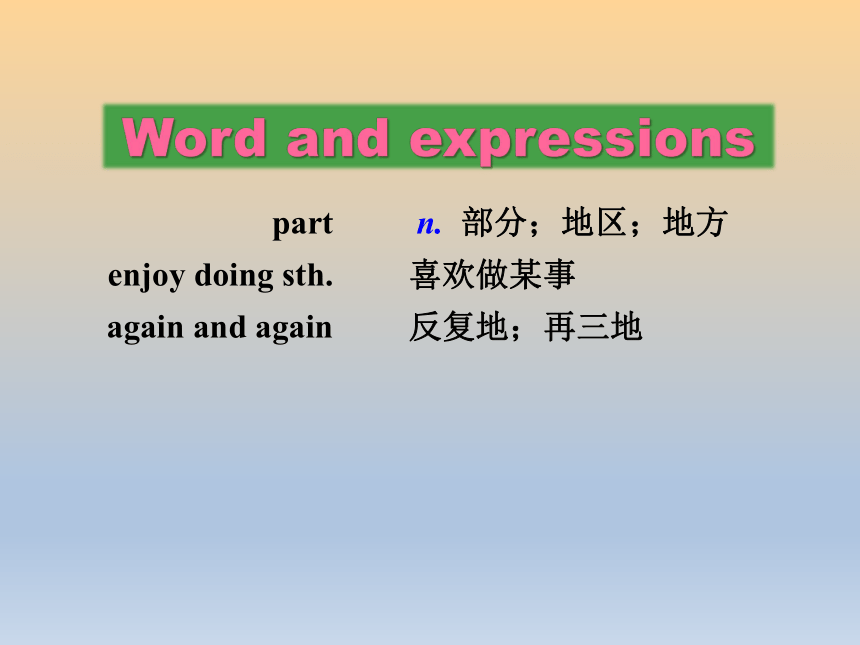
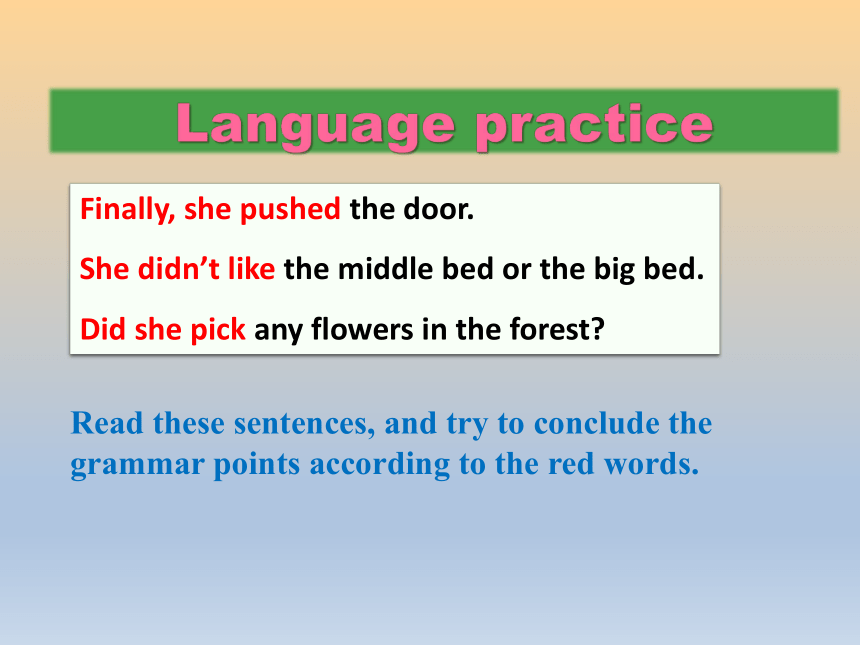



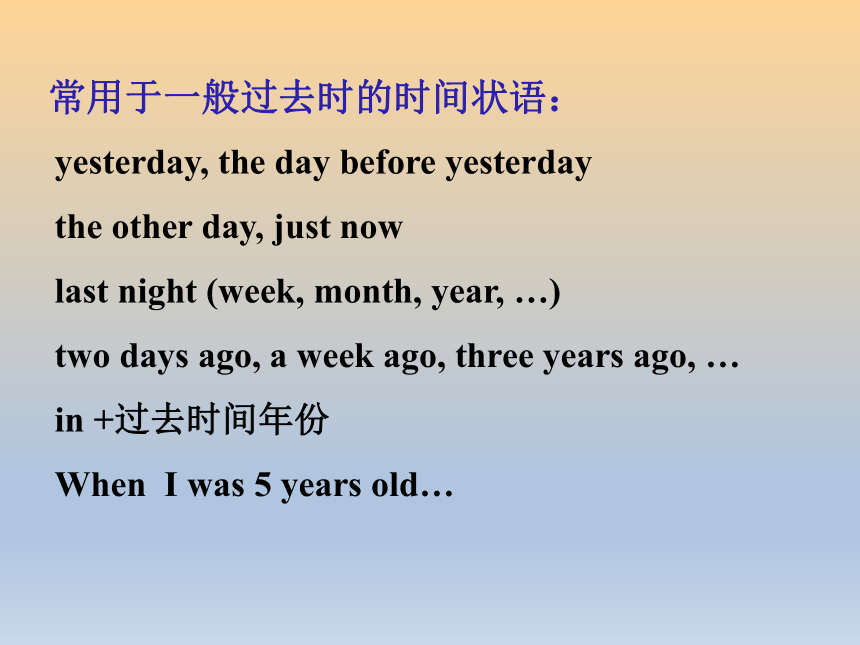

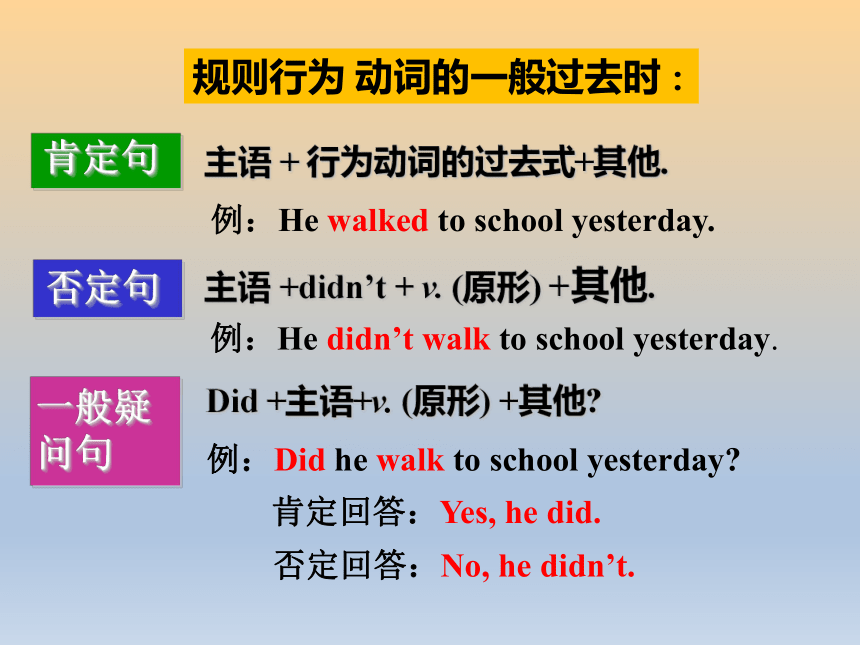
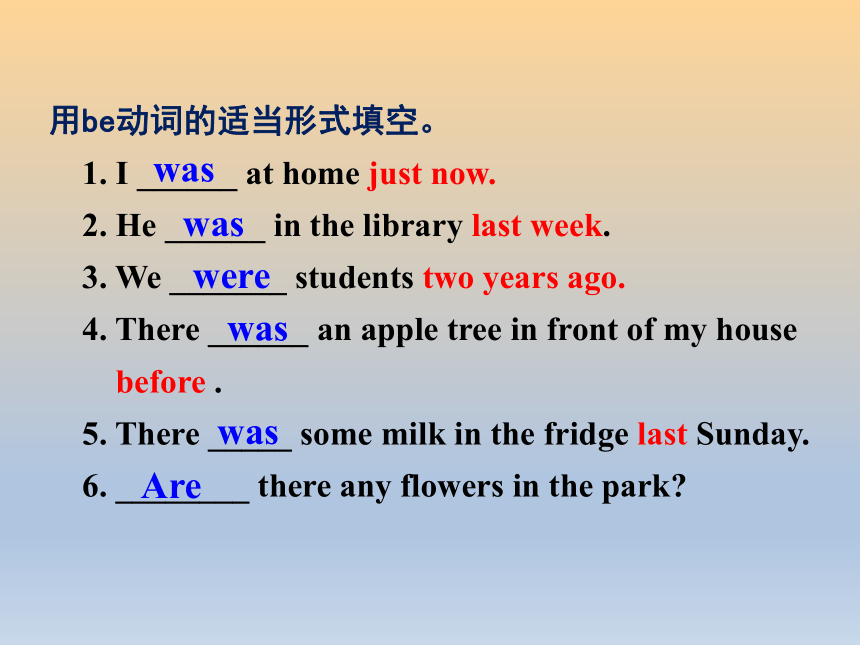
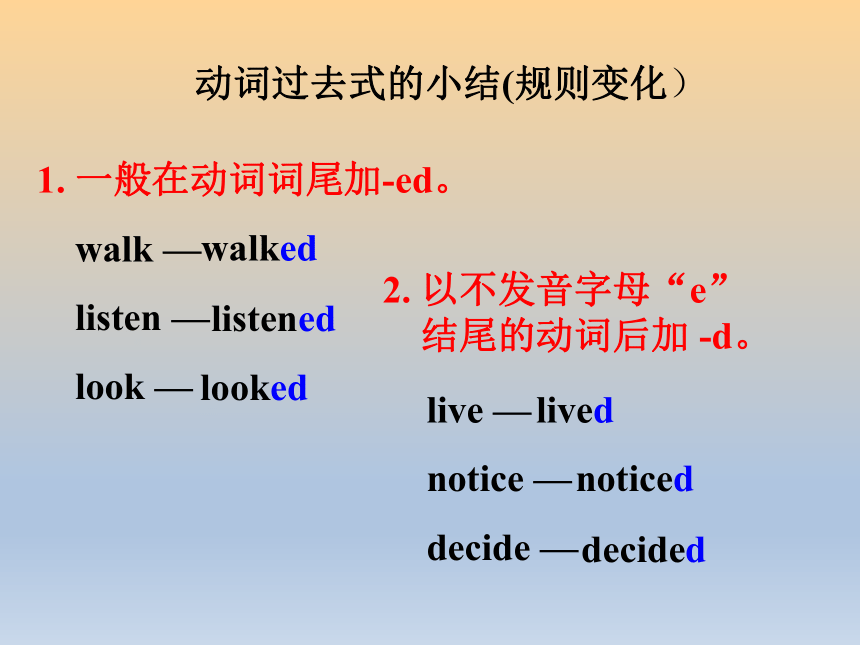
文档简介
(共44张PPT)
Unit 3 Language in use
Once upon a time there 1.____ (be) a farmer. He didn’t like to work. One day, he 2._______ (work) in his field. He was very tired and he 3._______(walk) to a big
tree. He 4._______(notice) a hare running and it hit(撞)
the tree. It 5.____ (die). He 6.________ (hurry) home with
the dead hare and had a good meal. The next day, he 7._______ (want) another hare. So he 8.________ (wait) under the tree and 9.________ (plan) to pick up another,
but he 10._______ (pick) none.
was
worked
walked
noticed
died
阅读下面短文,用所给词的适当形式填空,补全短文。
Practice
hurried
wanted
waited
planned
picked
n. 部分;地区;地方
喜欢做某事
反复地;再三地
part
enjoy doing sth.
again and again
Finally, she pushed the door.
She didn’t like the middle bed or the big bed.
Did she pick any flowers in the forest?
Read these sentences, and try to conclude the
grammar points according to the red words.
规则动词的过去形式怎样变化?
一般过去时的用法
1. 表示过去某个时间发生的动作或存在的状态。
例:He was at home the day before yesterday.
他前天在家。
I got up at six thirty yesterday morning.
我昨天早上六点三十分起床。
I visited my uncle last weekend.
上周末我拜访了我的叔叔。
2. 表示过去经常或反复发生的动作。
例:My father often went to work by bus last year.
我的爸爸去年经常乘公共汽车去上班。
He always carried an umbrella every day.
他每天都带一把伞。
常用于一般过去时的时间状语:
yesterday, the day before yesterday
the other day, just now
last night (week, month, year, …)
two days ago, a week ago, three years ago, …
in +过去时间年份
When I was 5 years old…
主语 + be动词的过去式(was, were)…
主语 + be动词的过去式(was, were)+ not…
be 动词的过去式(Was, Were)+主语 …?
例:He was busy yesterday.
例:He was not busy yesterday.
例:Was he busy yesterday?
含be 动词的过去时句子:
复习
主语 + 行为动词的过去式+其他.
主语 +didn’t + v. (原形) +其他.
Did +主语+v. (原形) +其他?
例:He walked to school yesterday.
例:He didn’t walk to school yesterday.
例:Did he walk to school yesterday?
规则行为 动词的一般过去时:
肯定回答:Yes, he did.
否定回答:No, he didn’t.
用be动词的适当形式填空。
1. I ______ at home just now.
2. He ______ in the library last week.
3. We _______ students two years ago.
4. There ______ an apple tree in front of my house
before .
5. There _____ some milk in the fridge last Sunday.
6. ________ there any flowers in the park?
was
was
were
was
was
Are
1. 一般在动词词尾加-ed。
walk —
listen —
look —
动词过去式的小结(规则变化)
2. 以不发音字母“e”
结尾的动词后加 -d。
live —
notice —
decide —
walked
listened
looked
lived
noticed
decided
3. 以辅音字母加-y结尾的动词,变y为i,
再加-ed。
hurry —
carry—
cry—
try—
tried
4. 以重读闭音节结尾且词尾只有一个辅音字母的动词,先双写后面辅音字母,再加-ed。
stop — step —
hurried
carried
cried
stopped
stepped
写出下列动词的过去式
1.knock— 2.pick —
3.walk— 4.push—
5.like— 6.finish—
7.stop— 8.notice—
9.answer— 10.enter—
11.hurry— 12.live—
13.find— 14.decide—
knocked picked
walked pushed
liked finished
stopped noticed
answered entered
hurried lived
found decided
answer enter hurry jump
like notice point return try
1 Baby bear _______ at the girl in his bed.
2 She _______ the house.
3 Goldilocks ________ out of bed.
4 She _______ to the little house.
5 The Three Bears didn’t _______ the door
because they were out in the forest.
pointed
entered
1 Complete the sentences with the correct form
of the words from the box.
jumped
hurried
answer
6 The Three Bears didn’t ______ Goldilocks in
bed at first.
7 Goldilocks didn’t _______to that part of the
forest again.
8 — Did she ______ the small chair first?
— No, she didn’t. She tried the big chair first.
9 — Did she ______ the small bed?
— Yes, she did.
notice
return
try
like
answer enter hurry jump
like notice point return try
2 Complete the passage with the correct form of
the words from the box.
Once upon a time there was a small boy called Tom. One day Tom _______ to go for a walk in the dark forest. He _______ for a short time and then he _______ some flowers. Next, he _______ a little house. He _________ on the door but nobody _________.
wanted
walked
picked
noticed
knocked
answered
answer ask enter knock
look notice pick walk want
He _______ the house. There ____ a big table, a big chair, a big bowl and a big bear. Then Tom ______ at the bowl of food with big eyes. The bear _____ Tom,“Are you hungry? Try some of my food.” Tom tried the food. Then they were good friends.
was
looked
asked
answer ask enter knock
look notice pick walk want
entered
1 Did Tom want to go for a walk in the dark forest?
2 Did he pick a lot of blue flowers?
3 Did he notice a house?
4 Did he knock on the door first?
Now work in pairs. Ask and answer the questions.
Yes, he did.
No, he didn’t.
Yes, he did.
Yes, he did.
Around the w rld
Little Red Riding Hood
All around the world parents tell their children Fairy tales. The stories are exciting and children enjoy listening to them again and again. In the stories, animals often speak and sometimes people become animals. The stories usually begin with “Once upon a time...”
Fairy tales
3 Work in pairs. Look at the pictures and
make sentences. Use the words given.
: Telling a story
The father loved the little girl.
The father and little girl played games in the garden.
The little girl fell off the boat and died in the sea.
She changed into a bird.
Her father watched the bird and
was unhappy.
The bird decided to fill the sea with the pebbles.
4 Put the sentences together to make a
story. Remember to use words like and,
so, but, because, first, next, and then and
finally.
5 Read your story to another pair and
listen to theirs.
Once upon a time, there was a little girl called Nüwa. Her father was Emperor Yan and he loved her very much.
One possible version
He often played with his daughter and they had a great time. One day, Nüwa went boating in the sea and fell into the sea and died because the sea was very rough. Nüwa changed into a beautiful bird after death. His father watched the bird and felt very sad. Nüwa decided to fill the sea with stones.
1. The stories are exciting and children enjoy listening
to them again and again.
enjoy v. 喜爱;享受。近义词:like、love。常用短
语:enjoy sth.喜欢某物;enjoy doing sth. 喜欢做
某事;enjoy oneself=have a good time=have fun 过
得开心,玩得愉快。
例:I enjoy this book very much. 我非常喜欢这本书。
She enjoyed herself on the summer vacation in
Sanya. 她暑假在三亚玩得很开心。
1. I enjoyed _____ storybooks when I was
young.
A. to reading B. to read
C. reading D. read
2. We enjoyed _____ on the Great Wall last
weekend.
A. myself B. himself
C. yourselves D. ourselves
学以致用
C
D
2. die 死亡
die在此处用作不及物动词,意为“死亡”。
例:How many people died in the accident?
在这次事故中有多少人死亡?
温馨提示:die为非延续性动词,与表示一段时间
的状语搭配使用时,应使用be dead结构。
例:His grandfather died 3 years ago.
=His grandfather has been dead for three years.
他爷爷去世三年了。
【拓展】① dead作形容词,意为“死的”,作定语或
表语。
例:We mourned for the dead soldiers.
我们哀悼那些死去的战士。
② dying作形容词,意为“临终的,垂死的”,只能作
定语,不能作表语。
例:The nurse is taking care of the dying man.
这名护士正在照料那个垂死的男人。
③ death作名词,意为“死亡”。
例:Some animals feign death when in danger.
有些动物在危险时装死。
一、选词填空。
1. He _______ interested in painting last year.
2. I jumped when I heard the ________ news.
3. _______, she decided to go shopping with her
mother.
4. His grandfather _____ two years ago.
5. You are _____ of my life.
part final become exciting die
became
exciting
Finally
died
part
二、用所给词的适当形式填空。
1. The old man _____ (die) last night.
2. Tom ________ (finish) all the food in his bowl.
3. My little sister _____ (cry) and ________ (shout)
loudly when she saw the rat.
4. I ______________ (not notice) that strange man
over there.
5. I _______ (not be) busy last week.
6. Jack and I _____ (be) late for school yesterday.
7. I _______ (walk) to school last Monday.
shouted
finished
didn’t noticed
died
cried
wasn’t
were
walked
三、根据汉语意思完成句子,一空一词。
1. 昨天我们班一些同学去了博物馆。
______ ____ the students in our class went to the
museum yesterday.
2. 他们只在中国待很短一段时间。
They only stay in China ____ ___ ______ _____.
3. 上课时我们应当认真听老师讲课。
We should _____ ___ the teacher carefully in class.
listen to
Some of
for a short time
4. 我的祖母反复地读这本书。
My grandma read this book _____ _____ _____.
5. 许多老故事都是以“很久很久以前”开始的。
Many old stories _____ _____ “Long long ago”.
6. 她向四周看了看,注意到一所小房子。
She _______ _______ her, and ________ a
little house.
7. 汤姆赶快来到那所房子。
Tom ________ ___ that house.
looked around
noticed
hurried to
again and again
begin with
8. 我想到河边散步。
I want to ___ ____ ___ ______ by the river.
9. 托尼睁开眼睛,从床上跳起来。
Tony _______ his eyes, and _______ ____ ___ the bed.
10. 史密斯一家人去年圣诞节在巴黎玩得很开心。
The Smiths ________ ___________ in Paris last
Christmas.
jumped out of
opened
go for a walk
enjoyed themselves
1. We decided ______ the zoo.
A. to go to B. go to C. going to D. went to
2. My sister is a little girl ___ black hair.
A. in B. with C. of D. without
3. Don’t _____ flowers in the park.
A. pick up B. pick
C. picking D. picking up
4. The door is open, but he can’t _____ the
house.
A. go B. walk C. arrive D. enter
四、单项选择。
A
B
B
D
5. The young man pointed _____ the strange
thing and _____, “What’s this?”
A. on; asked B. at; asks
C. to; asks D. at; asked
6. — Could you lend me a pen? I came
to school ____ my pen this morning.
— Of course.
A. with B. no C. not D. without
7. My mum didn’t _____ home.
A. return B. returned to
C. return to D. back
D
D
A
1. Word and phrases: part, enjoy doing sth.,
again and again
2. Sentences:
The stories are exciting and children enjoy listening
to them again and again.
3. Grammar: past simple tense
1. Review the word, phrases and stories we have
learned.
2. Finish the students’ exercise books.
3. Tell the stories to your family after school.
Unit 3 Language in use
Once upon a time there 1.____ (be) a farmer. He didn’t like to work. One day, he 2._______ (work) in his field. He was very tired and he 3._______(walk) to a big
tree. He 4._______(notice) a hare running and it hit(撞)
the tree. It 5.____ (die). He 6.________ (hurry) home with
the dead hare and had a good meal. The next day, he 7._______ (want) another hare. So he 8.________ (wait) under the tree and 9.________ (plan) to pick up another,
but he 10._______ (pick) none.
was
worked
walked
noticed
died
阅读下面短文,用所给词的适当形式填空,补全短文。
Practice
hurried
wanted
waited
planned
picked
n. 部分;地区;地方
喜欢做某事
反复地;再三地
part
enjoy doing sth.
again and again
Finally, she pushed the door.
She didn’t like the middle bed or the big bed.
Did she pick any flowers in the forest?
Read these sentences, and try to conclude the
grammar points according to the red words.
规则动词的过去形式怎样变化?
一般过去时的用法
1. 表示过去某个时间发生的动作或存在的状态。
例:He was at home the day before yesterday.
他前天在家。
I got up at six thirty yesterday morning.
我昨天早上六点三十分起床。
I visited my uncle last weekend.
上周末我拜访了我的叔叔。
2. 表示过去经常或反复发生的动作。
例:My father often went to work by bus last year.
我的爸爸去年经常乘公共汽车去上班。
He always carried an umbrella every day.
他每天都带一把伞。
常用于一般过去时的时间状语:
yesterday, the day before yesterday
the other day, just now
last night (week, month, year, …)
two days ago, a week ago, three years ago, …
in +过去时间年份
When I was 5 years old…
主语 + be动词的过去式(was, were)…
主语 + be动词的过去式(was, were)+ not…
be 动词的过去式(Was, Were)+主语 …?
例:He was busy yesterday.
例:He was not busy yesterday.
例:Was he busy yesterday?
含be 动词的过去时句子:
复习
主语 + 行为动词的过去式+其他.
主语 +didn’t + v. (原形) +其他.
Did +主语+v. (原形) +其他?
例:He walked to school yesterday.
例:He didn’t walk to school yesterday.
例:Did he walk to school yesterday?
规则行为 动词的一般过去时:
肯定回答:Yes, he did.
否定回答:No, he didn’t.
用be动词的适当形式填空。
1. I ______ at home just now.
2. He ______ in the library last week.
3. We _______ students two years ago.
4. There ______ an apple tree in front of my house
before .
5. There _____ some milk in the fridge last Sunday.
6. ________ there any flowers in the park?
was
was
were
was
was
Are
1. 一般在动词词尾加-ed。
walk —
listen —
look —
动词过去式的小结(规则变化)
2. 以不发音字母“e”
结尾的动词后加 -d。
live —
notice —
decide —
walked
listened
looked
lived
noticed
decided
3. 以辅音字母加-y结尾的动词,变y为i,
再加-ed。
hurry —
carry—
cry—
try—
tried
4. 以重读闭音节结尾且词尾只有一个辅音字母的动词,先双写后面辅音字母,再加-ed。
stop — step —
hurried
carried
cried
stopped
stepped
写出下列动词的过去式
1.knock— 2.pick —
3.walk— 4.push—
5.like— 6.finish—
7.stop— 8.notice—
9.answer— 10.enter—
11.hurry— 12.live—
13.find— 14.decide—
knocked picked
walked pushed
liked finished
stopped noticed
answered entered
hurried lived
found decided
answer enter hurry jump
like notice point return try
1 Baby bear _______ at the girl in his bed.
2 She _______ the house.
3 Goldilocks ________ out of bed.
4 She _______ to the little house.
5 The Three Bears didn’t _______ the door
because they were out in the forest.
pointed
entered
1 Complete the sentences with the correct form
of the words from the box.
jumped
hurried
answer
6 The Three Bears didn’t ______ Goldilocks in
bed at first.
7 Goldilocks didn’t _______to that part of the
forest again.
8 — Did she ______ the small chair first?
— No, she didn’t. She tried the big chair first.
9 — Did she ______ the small bed?
— Yes, she did.
notice
return
try
like
answer enter hurry jump
like notice point return try
2 Complete the passage with the correct form of
the words from the box.
Once upon a time there was a small boy called Tom. One day Tom _______ to go for a walk in the dark forest. He _______ for a short time and then he _______ some flowers. Next, he _______ a little house. He _________ on the door but nobody _________.
wanted
walked
picked
noticed
knocked
answered
answer ask enter knock
look notice pick walk want
He _______ the house. There ____ a big table, a big chair, a big bowl and a big bear. Then Tom ______ at the bowl of food with big eyes. The bear _____ Tom,“Are you hungry? Try some of my food.” Tom tried the food. Then they were good friends.
was
looked
asked
answer ask enter knock
look notice pick walk want
entered
1 Did Tom want to go for a walk in the dark forest?
2 Did he pick a lot of blue flowers?
3 Did he notice a house?
4 Did he knock on the door first?
Now work in pairs. Ask and answer the questions.
Yes, he did.
No, he didn’t.
Yes, he did.
Yes, he did.
Around the w rld
Little Red Riding Hood
All around the world parents tell their children Fairy tales. The stories are exciting and children enjoy listening to them again and again. In the stories, animals often speak and sometimes people become animals. The stories usually begin with “Once upon a time...”
Fairy tales
3 Work in pairs. Look at the pictures and
make sentences. Use the words given.
: Telling a story
The father loved the little girl.
The father and little girl played games in the garden.
The little girl fell off the boat and died in the sea.
She changed into a bird.
Her father watched the bird and
was unhappy.
The bird decided to fill the sea with the pebbles.
4 Put the sentences together to make a
story. Remember to use words like and,
so, but, because, first, next, and then and
finally.
5 Read your story to another pair and
listen to theirs.
Once upon a time, there was a little girl called Nüwa. Her father was Emperor Yan and he loved her very much.
One possible version
He often played with his daughter and they had a great time. One day, Nüwa went boating in the sea and fell into the sea and died because the sea was very rough. Nüwa changed into a beautiful bird after death. His father watched the bird and felt very sad. Nüwa decided to fill the sea with stones.
1. The stories are exciting and children enjoy listening
to them again and again.
enjoy v. 喜爱;享受。近义词:like、love。常用短
语:enjoy sth.喜欢某物;enjoy doing sth. 喜欢做
某事;enjoy oneself=have a good time=have fun 过
得开心,玩得愉快。
例:I enjoy this book very much. 我非常喜欢这本书。
She enjoyed herself on the summer vacation in
Sanya. 她暑假在三亚玩得很开心。
1. I enjoyed _____ storybooks when I was
young.
A. to reading B. to read
C. reading D. read
2. We enjoyed _____ on the Great Wall last
weekend.
A. myself B. himself
C. yourselves D. ourselves
学以致用
C
D
2. die 死亡
die在此处用作不及物动词,意为“死亡”。
例:How many people died in the accident?
在这次事故中有多少人死亡?
温馨提示:die为非延续性动词,与表示一段时间
的状语搭配使用时,应使用be dead结构。
例:His grandfather died 3 years ago.
=His grandfather has been dead for three years.
他爷爷去世三年了。
【拓展】① dead作形容词,意为“死的”,作定语或
表语。
例:We mourned for the dead soldiers.
我们哀悼那些死去的战士。
② dying作形容词,意为“临终的,垂死的”,只能作
定语,不能作表语。
例:The nurse is taking care of the dying man.
这名护士正在照料那个垂死的男人。
③ death作名词,意为“死亡”。
例:Some animals feign death when in danger.
有些动物在危险时装死。
一、选词填空。
1. He _______ interested in painting last year.
2. I jumped when I heard the ________ news.
3. _______, she decided to go shopping with her
mother.
4. His grandfather _____ two years ago.
5. You are _____ of my life.
part final become exciting die
became
exciting
Finally
died
part
二、用所给词的适当形式填空。
1. The old man _____ (die) last night.
2. Tom ________ (finish) all the food in his bowl.
3. My little sister _____ (cry) and ________ (shout)
loudly when she saw the rat.
4. I ______________ (not notice) that strange man
over there.
5. I _______ (not be) busy last week.
6. Jack and I _____ (be) late for school yesterday.
7. I _______ (walk) to school last Monday.
shouted
finished
didn’t noticed
died
cried
wasn’t
were
walked
三、根据汉语意思完成句子,一空一词。
1. 昨天我们班一些同学去了博物馆。
______ ____ the students in our class went to the
museum yesterday.
2. 他们只在中国待很短一段时间。
They only stay in China ____ ___ ______ _____.
3. 上课时我们应当认真听老师讲课。
We should _____ ___ the teacher carefully in class.
listen to
Some of
for a short time
4. 我的祖母反复地读这本书。
My grandma read this book _____ _____ _____.
5. 许多老故事都是以“很久很久以前”开始的。
Many old stories _____ _____ “Long long ago”.
6. 她向四周看了看,注意到一所小房子。
She _______ _______ her, and ________ a
little house.
7. 汤姆赶快来到那所房子。
Tom ________ ___ that house.
looked around
noticed
hurried to
again and again
begin with
8. 我想到河边散步。
I want to ___ ____ ___ ______ by the river.
9. 托尼睁开眼睛,从床上跳起来。
Tony _______ his eyes, and _______ ____ ___ the bed.
10. 史密斯一家人去年圣诞节在巴黎玩得很开心。
The Smiths ________ ___________ in Paris last
Christmas.
jumped out of
opened
go for a walk
enjoyed themselves
1. We decided ______ the zoo.
A. to go to B. go to C. going to D. went to
2. My sister is a little girl ___ black hair.
A. in B. with C. of D. without
3. Don’t _____ flowers in the park.
A. pick up B. pick
C. picking D. picking up
4. The door is open, but he can’t _____ the
house.
A. go B. walk C. arrive D. enter
四、单项选择。
A
B
B
D
5. The young man pointed _____ the strange
thing and _____, “What’s this?”
A. on; asked B. at; asks
C. to; asks D. at; asked
6. — Could you lend me a pen? I came
to school ____ my pen this morning.
— Of course.
A. with B. no C. not D. without
7. My mum didn’t _____ home.
A. return B. returned to
C. return to D. back
D
D
A
1. Word and phrases: part, enjoy doing sth.,
again and again
2. Sentences:
The stories are exciting and children enjoy listening
to them again and again.
3. Grammar: past simple tense
1. Review the word, phrases and stories we have
learned.
2. Finish the students’ exercise books.
3. Tell the stories to your family after school.
同课章节目录
- Module 1 Lost and found
- Unit 1 Whose bag is this?
- Unit 2 Are they yours?
- Unit 3 Language in use
- Module 2 What can you do ?
- Unit 1 I can play the piano
- Unit 2 I can run really fast
- Unit 3 Language in use
- Module 3 Making plans
- Unit 1 What are you going to do at the weekends?
- Unit 2 We're going to cheer the players.
- Unit 3 Language in use
- Module 4 Life in the future
- Unit 1 Everyone will study at home
- Unit 2 Every family will have a small plane.
- Unit 3 Language in use
- Module 5 Shopping
- Unit 1 What can I do for you?
- Unit 2 You can buy everything on the Internet
- Unit 3 Language in use
- Module 6 Around town
- Unit 1 Could you tell me how to get to the Nationa
- Unit 2 The London Eye is on your right.
- Unit 3 Language in use
- Revision module A
- Module 7 My past life
- Unit 1 I was born in a small village.
- Unit 2 I was born in Quincy.
- Unit 3 Language in use
- Module 8 Story time
- Unit 1 Once upon a time….
- Unit 2 Goldilocks hurried out of the house.
- Unit 3 Language in use
- Module 9 Life history
- Unit 1 He left school and began work at the age of
- Unit 2 He decided to be an actor.
- Unit 3 Language in use
- Module 10 A holiday journey
- Unit 1 What did you do?
- Unit 2 This morning we took a walk.
- Unit 3 Language in use
- Module 11 Body language
- Unit 1 They touch noses!
- Unit 2 Here are some ways to welcome them.
- Unit 3 Language in use
- Module 12 Western music
- Unit 1 It's so beautiful!
- Unit 2 Vienna is the centre of European classical
- Unit 3 Language in use
- Revision module B
